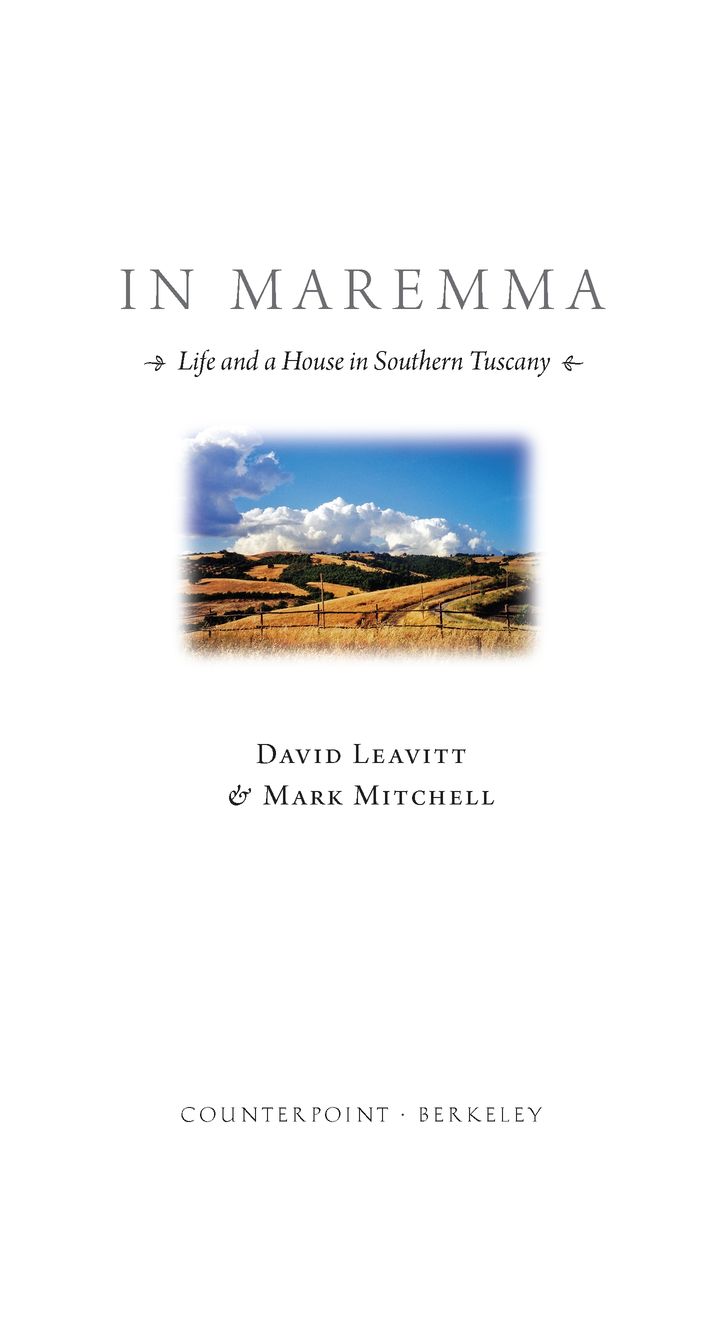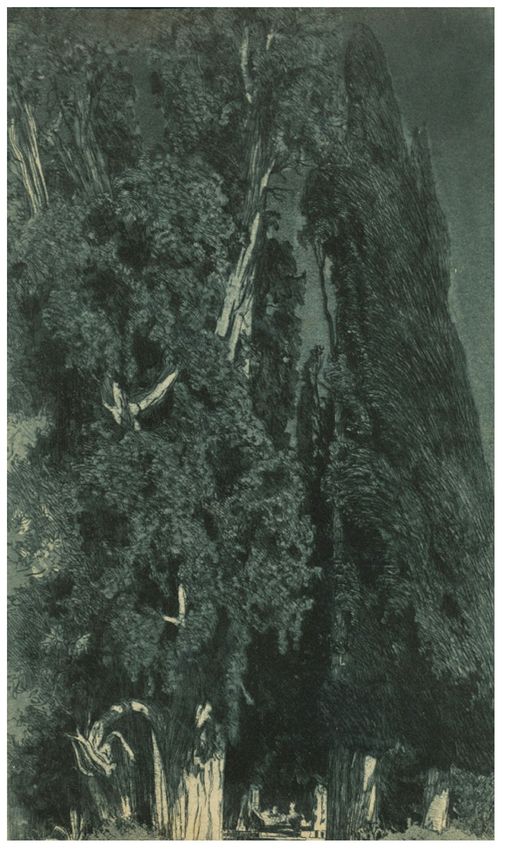In Maremma
Authors: David Leavitt



Table of Contents
Â
Â
Â
Opposite: Looking North from Podere Fiume
(Photo by MM)
(Photo by MM)
Traversando la Maremma Toscana
Â
Â
Dolce paese, onde portai conforme
l'abito fiero e lo sdegnoso canto
e il petto ov'odio e amor mai non s'addorme,
pur ti riveggo, e il cuor mi balza intanto.
l'abito fiero e lo sdegnoso canto
e il petto ov'odio e amor mai non s'addorme,
pur ti riveggo, e il cuor mi balza intanto.
Â
Ben riconosco in te le usate forme
con gli occhi incerti fra âl sorriso e il pianto,
e in quelle seguo de' miei sogni l'orme
erranti dietro il giovenile incanto.
con gli occhi incerti fra âl sorriso e il pianto,
e in quelle seguo de' miei sogni l'orme
erranti dietro il giovenile incanto.
Â
Oh, quel che amai, quel che sognai, fu invano,
e sempre corsi, e mai non giunsi il fine:
e dimani cadrò. Ma di lontano
e sempre corsi, e mai non giunsi il fine:
e dimani cadrò. Ma di lontano
Â
pace dicono al cuor le tue colline
con le nebbie sfumanti e il verde piano
ridente ne le piogge mattutine.
con le nebbie sfumanti e il verde piano
ridente ne le piogge mattutine.
Â
Giosuè Carducci
Rime Nuove,
XVI
Rime Nuove,
XVI
Crossing the Tuscan Maremma
Â
Â
Sweet land, from whence I derive
My habit of pride and my scornful song
And this bosom where hate and love are never appeased,
When I return to you, my heart leaps after so long.
My habit of pride and my scornful song
And this bosom where hate and love are never appeased,
When I return to you, my heart leaps after so long.
Â
I rediscover your familiar forms,
And through uncertain eyes, through smiles and tears,
Follow the errant tracks of dreams
That lead to my youthful enchantment with you.
And through uncertain eyes, through smiles and tears,
Follow the errant tracks of dreams
That lead to my youthful enchantment with you.
Â
Oh, what I loved, what I dreamed was in vain,
After so much wandering, I never reached the end,
And tomorrow I'll die. But from afar
After so much wandering, I never reached the end,
And tomorrow I'll die. But from afar
Â
Your hills fill my heart with hope,
Steaming with mist and the green plains
Lovely in the morning rains.
Steaming with mist and the green plains
Lovely in the morning rains.
Â
Giosuè Carducci
Rime Nuove
, XVI
(Trans. Elena Giustarini)
Rime Nuove
, XVI
(Trans. Elena Giustarini)
1
W
E FIRST SAW Podere Fiume, or “River Farm,” on a cold and rainy afternoon in January 1997. (Some people called the place Podere Bolseto because of the
localitÃ
in which it lay.) The plain two-story house had been built in the 1950s as part of the Ente Maremma program to stimulate the economy of Southern Tuscany. No one had lived in it for more than twenty years. The downstairs consisted entirely of animal stalls, in the largest of which (the one that would become our living room) there were concrete feeding troughs it would take three weeks to demolish. A crumbling outdoor staircase led to the apartment upstairsâfour rooms tiled in terrazzo. In the big kitchen there was a Zoppas wood-burning stove barely tall enough for a child to cook at, a 1950s cabinet-and-counter unit in yellow and blue Formicaâthis latter empty save for a drinking glass from a long-past promotion for Acqua Panna bottled waterâand a carved stone sink.
E FIRST SAW Podere Fiume, or “River Farm,” on a cold and rainy afternoon in January 1997. (Some people called the place Podere Bolseto because of the
localitÃ
in which it lay.) The plain two-story house had been built in the 1950s as part of the Ente Maremma program to stimulate the economy of Southern Tuscany. No one had lived in it for more than twenty years. The downstairs consisted entirely of animal stalls, in the largest of which (the one that would become our living room) there were concrete feeding troughs it would take three weeks to demolish. A crumbling outdoor staircase led to the apartment upstairsâfour rooms tiled in terrazzo. In the big kitchen there was a Zoppas wood-burning stove barely tall enough for a child to cook at, a 1950s cabinet-and-counter unit in yellow and blue Formicaâthis latter empty save for a drinking glass from a long-past promotion for Acqua Panna bottled waterâand a carved stone sink.
Three doors opened off this kitchen. One led into a green bedroom with a print of a nondescript Madonna hanging on the north wall, one into a pink bedroom that reminded a friend of ours of Pompeii, and the third into a biscuit-colored bedroom that contained a coarse straw bed and a stuffed wading bird. There was also a minute
bathroom. No closets. Doves had built nests between the windows and the boiled-spinach-green shutters.
bathroom. No closets. Doves had built nests between the windows and the boiled-spinach-green shutters.
Â
The Old Kitchen, Podere Fiume
(Photo by MM)
(Photo by MM)

The house sat on the crest of a softly proportioned hill, on about two acres of land, one acre of which was given over to forty olive trees and as many fruit trees: apricot, pear, nectarine, white peach, and three varieties of plum. At the base of the
poggio
a tree-lined rivuletâdry during the summer monthsâcurved alluringly. (It was because of this rivulet that the house had been named Podere Fiume.)
poggio
a tree-lined rivuletâdry during the summer monthsâcurved alluringly. (It was because of this rivulet that the house had been named Podere Fiume.)
From upstairs one could see where a famous battle had been fought many centuries ago. One could also see the Monte Argentario peninsula, as well as the “skylines”
of the villages of Saturnia and Montemerano, and the town of Manciano. Around us there was pasture land for sheep, farmland which produced hay, wheat, and sunflowers, and a couple of small vineyards. The trees were mostly oaks, pines, and chestnuts. (One of the most beautiful, even moving sights was that of a lone, gnarled, ancient oak in the middle of an expanse of pasture.) The sheep created the illusion of boulders cropping out from the grass. There were few of the cypresses which are the presiding genius of the land around Florence, for the Maremmani associate them with cemeteries.
of the villages of Saturnia and Montemerano, and the town of Manciano. Around us there was pasture land for sheep, farmland which produced hay, wheat, and sunflowers, and a couple of small vineyards. The trees were mostly oaks, pines, and chestnuts. (One of the most beautiful, even moving sights was that of a lone, gnarled, ancient oak in the middle of an expanse of pasture.) The sheep created the illusion of boulders cropping out from the grass. There were few of the cypresses which are the presiding genius of the land around Florence, for the Maremmani associate them with cemeteries.

We had not gone to Italy in 1993 with the idea of restoring any kind of property. In fact, when we went thereâto Florence (having lucked out in finding an apartment on Via dei Neri)âwe intended to stay for only one year. But that year flowed into another. The third year, with the vigorous encouragement of a journalist friend named Lou Inturrisi, we moved to Rome, where his friend Karen Wolman was renting her apartment on Via San Giovanni in Laterano. (Lou told us that Karen was “the potato-sack heiress,” but that we must pretend we did not know this.) We became friends with Karen's architect, Domenico Minchilli, and his American wife, Elizabeth, a one-woman industry of books and articles about Italy. Soon, however, we grew tired of living in what an art historian friend called the “beautiful, infernal chaos” that was Rome, and when Lou was murdered (we gave evidence to the carabinieri on the very morning of Princess Diana's funeral), we decided to look for a quiet placeânot in Chiantishire, not in the environs of “Beverly Hills” (an area of Umbria so-called because its first American colonist was the artist Beverly Pepper). In Maremma, we hoped, we would be able to hear our own voices in the safe silence. As the crow flies, Semproniano, our
comune
, was pretty much midway between Rome and Florence. The closest train stations were in Grosseto and Orvieto. When there was no moon, the night sky was so dark and yet so clear that it seemed as if one could see every star.
comune
, was pretty much midway between Rome and Florence. The closest train stations were in Grosseto and Orvieto. When there was no moon, the night sky was so dark and yet so clear that it seemed as if one could see every star.
Â
Heiliger Hain (Holy Grove)
(Etching by Max Suppantschitsch, 1865â1953)
(Etching by Max Suppantschitsch, 1865â1953)

Perhaps because man and beast had lived peacefully together under its roof, Podere Fiume had a good soul as well as good bones. Indeed, as we walked through it that first afternoon, the idea that we would bring the house back to life suddenly seemed natural, even inevitable. Podere Fiume spoke to us from its spirit, not its splendorâthere were no frescos beneath the plaster, no Etruscan
necropoli in the oliveto
(olive grove).
necropoli in the oliveto
(olive grove).
Â
Necropoli Etrusca del Puntone (Seventh Century B.C.), Saturnia
(Photo by MM)
(Photo by MM)

As it happened, the owner, a local farmer and bon vivant with the extraordinary name of Loando, had had
a stroke a few days earlier and was in the hospital in Pitigliano. We made an offer which, by the end of the day, he had accepted from his bed. To our mild surprise, we jumped the bureaucratic hurdles successfully and more or less gracefully, and on the first day of spring, Podere Fiume legally became ours. We celebrated the occasion, as is the custom, by having lunch with its former owner, our respective notaries, the real estate agent, and Domenico at the restaurant of a small hotel in Poggio Capanne, the proprietors of which some Roman friends affectionately called I Puffiâthe Smurfs.
a stroke a few days earlier and was in the hospital in Pitigliano. We made an offer which, by the end of the day, he had accepted from his bed. To our mild surprise, we jumped the bureaucratic hurdles successfully and more or less gracefully, and on the first day of spring, Podere Fiume legally became ours. We celebrated the occasion, as is the custom, by having lunch with its former owner, our respective notaries, the real estate agent, and Domenico at the restaurant of a small hotel in Poggio Capanne, the proprietors of which some Roman friends affectionately called I Puffiâthe Smurfs.
Other books
The Last Holiday Concert by Andrew Clements
All New People by Zach Braff
Lincoln's Wizard by Tracy Hickman, Dan Willis
Sunset Surrender by Charlene Sands
Divine by Cait Jarrod
Sorcerer: Betrayal: Power of Air (Book 4) by D. L. Harrison
Finding Fortune by Delia Ray
Always a Cowboy by Linda Lael Miller
The Map of All Things by Kevin J. Anderson, Kevin J. Anderson
The Bachelorette Party by Karen McCullah Lutz